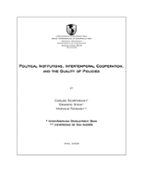Political Institutions, Intertemporal Cooperation, and the Quality of Policies
Date
Apr 2009
Journal version
While economists have tended to focus on specific public policies when developing recommendations, the achievement of welfare objectives might depend more on the quality of policies than their content. This paper develops several measures of the qualities of policies across countries, arguing that the quality of public policies depends on each politys ability to strike intertemporal transactions necessary to develop and sustain effective policies. The analytical framework developed here indicates that this ability depends on several characteristics of political institutions, such as congressional capabilities, judicial independence, and bureaucratic independence and professionalism. The empirical evidence presented supports this idea. The measures of policy quality developed here could be utilized for other purposes, including the determination of conditions under which more public spending in a given area is likely to generate the desired outcomes.




